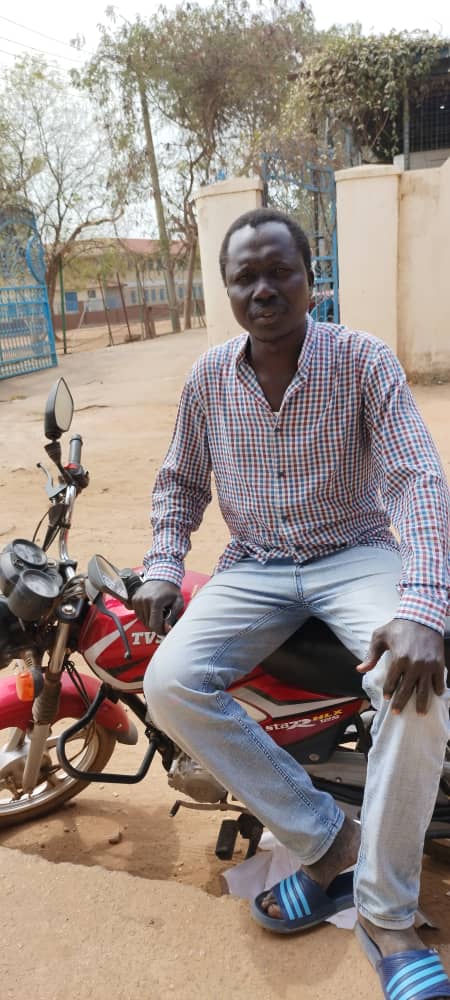South Sudan's English Daily Newspaper
"We Dare where others fear"

By Benjamin Takpiny
Sadam Godfrey Bosco holds a Bachelor of Wildlife Conservation from the University of Juba and yet earns a living as a boda boda (motorcycle taxi) driver.
In 2013, before crisis broke out in South Sudan, Bosco, jobless and without money decided to join the commercial riding business to take care of his family.
After the crisis broke out, and businesses closed, with people becoming unemployed, the boda boda work of Bosco became a blessing in disguise.
“During that time I was constructing my house in Yei. I was also a student and had also 3 children who are also schooling. The same money I was saving and used it for paying my tuition fee in the University of Juba and also paying for my children plus feeding, until 2017 when I graduated,” the 39 year old told The Dawn in an interview.
“I was able to raised money and constructed a house in Yei. I built that house through the work of Bodaboda.”
Without a job in line with his profession, Bosco has continued with the boda boda operation, riding out the issues of the crisis, and with relative peace being enjoyed in South Sudan, he has the opportunity to cushion arising constrains.
“I am still doing boda boda, my family are surviving on this boda boda work I am doing,” Bosco said.
“Bodaboda is about the struggle. If you are a hardworking person, you will be able to raise money that will make you to support your family but if you are lazy you will not raise that money because the competition is very high,” he said.
“Since I graduated there was no work , I continue doing the boda and the same time , I am renting in Juba.”
For Bosco, boda boda is God given and will continue in it until there comes a time he gets a job in his profession.
It’s among the informal sector generally viewed by people as a locus of the disadvantaged, unskilled, and inexperienced workers in under-developed and developing economies. Yet looking at a research work, “transforming informal work and livelihoods in China” published on the “WIDER Working Paper 150/2020” by Carl Shu-Ming Lin, Linxiang Ye and Wei Zhang, workers in the informal sector, however, can learn skills and gain experience that could help them switch to better-paying jobs in the formal sector.
The authors took their studies in China seeing it as an important case study because its the most populous country and has the largest labour force. “Our results show that transitioning jobs from the informal to the formal sector and from the self-employed to the wage-employed increases earnings, which improves the livelihoods of Chinese workers,” the authors wrote.
China is a country that has transformed from an agricultural society into an emerging, dynamic, and industrialized nation and has undergone rapid urbanization. The standard of living of the Chinese continues to rise and is taking rapid strides forward to a higher level of comprehensive well-being. Its development has indicated that the livelihood of the people is a key factor in economic and social construction. Of course having sufficient food and clothing is the first step in improving the livelihood of the people and a higher level of well-being can be achieved only after the basic needs are met but its worth that individuals also participate in that achievement and which collectively lead to income distribution as the source, social security as the support, and public safety as an assurance.
One other important aspect of livehood development in China is based on ‘guanxi’, or personal relationships and connections which are crucial in business and administration in China. Chinese people traditionally do business based on mutual trust like those of the boda boda and which Bosco alludes to.
Promoted by the peace in the country, which brings people together, and with their own version of ‘guanxi’, Bosco and fellow riders put money periodically and give a member to develop themselves. It is again reciprocated until all members gain.
“In Bodaboda work you can raise and save something, like what we are doing, we are doing cash round, we collect 3000 SSP from each person everyday and pay one person after 2 days, and that money can help you to buy you own motorcycle,” he said.
He slaps an advice for fellow South Sudanese graduates as well as generally, who have no jobs.
“What I can tell my brothers and sisters who graduated from University, they cannot continue sitting down without jobs, continue waiting every day. Let them hustle to get something small than waiting for white collar jobs. If anyone has a motorbike or learns how to ride a bike, they can just reach an agreement with the owner of a bike and start doing what I am doing now to achieve their goals because you cannot just sit idle without doing anything.”



